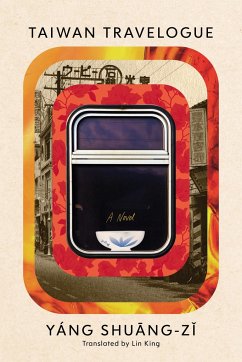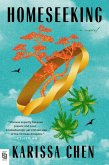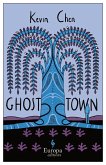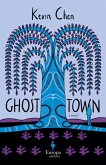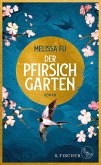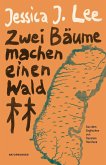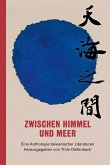WINNER OF THE 2024 NATIONAL BOOK AWARD FOR TRANSLATED LITERATURE
A bittersweet story of love between two women, nested in an artful exploration of language, history, and power
May 1938. The young novelist Aoyama Chizuko has sailed from her home in Nagasaki, Japan, and arrived in Taiwan. She's been invited there by the Japanese government ruling the island, though she has no interest in their official banquets or imperialist agenda. Instead, Chizuko longs to experience real island life and to taste as much of its authentic cuisine as her famously monstrous appetite can bear.
Soon a Taiwanese woman-who is younger even than she is, and who shares the characters of her name-is hired as her interpreter and makes her dreams come true. The charming, erudite, meticulous Chizuru arranges Chizuko's travels all over the Land of the South and also proves to be an exceptional cook. Over scenic train rides and braised pork rice, lively banter and winter melon tea, Chizuko grows infatuated with her companion and intent on drawing her closer. But something causes Chizuru to keep her distance. It's only after a heartbreaking separation that Chizuko begins to grasp what the "something" is.
Disguised as a translation of a rediscovered text by a Japanese writer, this novel was a sensation on its first publication in Mandarin Chinese in 2020 and won Taiwan's highest literary honor, the Golden Tripod Award. Taiwan Travelogue unburies lost colonial histories and deftly reveals how power dynamics inflect our most intimate relationships.
A bittersweet story of love between two women, nested in an artful exploration of language, history, and power
May 1938. The young novelist Aoyama Chizuko has sailed from her home in Nagasaki, Japan, and arrived in Taiwan. She's been invited there by the Japanese government ruling the island, though she has no interest in their official banquets or imperialist agenda. Instead, Chizuko longs to experience real island life and to taste as much of its authentic cuisine as her famously monstrous appetite can bear.
Soon a Taiwanese woman-who is younger even than she is, and who shares the characters of her name-is hired as her interpreter and makes her dreams come true. The charming, erudite, meticulous Chizuru arranges Chizuko's travels all over the Land of the South and also proves to be an exceptional cook. Over scenic train rides and braised pork rice, lively banter and winter melon tea, Chizuko grows infatuated with her companion and intent on drawing her closer. But something causes Chizuru to keep her distance. It's only after a heartbreaking separation that Chizuko begins to grasp what the "something" is.
Disguised as a translation of a rediscovered text by a Japanese writer, this novel was a sensation on its first publication in Mandarin Chinese in 2020 and won Taiwan's highest literary honor, the Golden Tripod Award. Taiwan Travelogue unburies lost colonial histories and deftly reveals how power dynamics inflect our most intimate relationships.
Winner of the National Book Award
"Reading the book is like peeling an onion: the smell is at first undetectable; but with each layer you peel, the smell gets more intoxicating, pungent, intense, and at the very end, it brings tears to your eyes."-Christina Ng
"Yáng Shuang-z 's novel, a runaway bestseller in Taiwan, ranges from playful and intimate depictions of the lush countryside of Taiwan to the ordered world of the colonial city. But what at first feels like a simple travelogue is actually an examination of an often-overlooked period of East Asian history and of the human heart. This wise and wily novel, as self-aware as it is provocative, ultimately goes down like the luscious dumplings that appear in its pages and sent me scrambling for takeout. But what does it mean to eat someone else's food, and what is the nature of a relationship when any kind of power is involved? Beginning in a world as solid and stately as Jun'ichir Tanizaki's The Makioka Sisters, Taiwan Travelogue deftly takes the reader down a rabbit hole as filled with longing and misunderstanding as Sarah Waters's The Night Watch."-Marie Mutsuki Mockett, author of The Tree Doctor
"Yáng offers rich reflections on colonialism and translation along with delightful depictions of Taiwanese delicacies."-Publishers Weekly
"Translator Lin King manages to produce a metafictional English text that is rich and intimate, full of poetry and humor, and which comfortably plays with the layers of Japanese and Mandarin Chinese. But King's main achievement might be how she carries and sustains the subtle tensions hidden in bits of dialogue, how the nature of the two women's platonic relationship oscillates with each line and encounter. It's an achievement."-Bruna Dantas Lobato
"Reading the book is like peeling an onion: the smell is at first undetectable; but with each layer you peel, the smell gets more intoxicating, pungent, intense, and at the very end, it brings tears to your eyes."-Christina Ng
"Yáng Shuang-z 's novel, a runaway bestseller in Taiwan, ranges from playful and intimate depictions of the lush countryside of Taiwan to the ordered world of the colonial city. But what at first feels like a simple travelogue is actually an examination of an often-overlooked period of East Asian history and of the human heart. This wise and wily novel, as self-aware as it is provocative, ultimately goes down like the luscious dumplings that appear in its pages and sent me scrambling for takeout. But what does it mean to eat someone else's food, and what is the nature of a relationship when any kind of power is involved? Beginning in a world as solid and stately as Jun'ichir Tanizaki's The Makioka Sisters, Taiwan Travelogue deftly takes the reader down a rabbit hole as filled with longing and misunderstanding as Sarah Waters's The Night Watch."-Marie Mutsuki Mockett, author of The Tree Doctor
"Yáng offers rich reflections on colonialism and translation along with delightful depictions of Taiwanese delicacies."-Publishers Weekly
"Translator Lin King manages to produce a metafictional English text that is rich and intimate, full of poetry and humor, and which comfortably plays with the layers of Japanese and Mandarin Chinese. But King's main achievement might be how she carries and sustains the subtle tensions hidden in bits of dialogue, how the nature of the two women's platonic relationship oscillates with each line and encounter. It's an achievement."-Bruna Dantas Lobato

